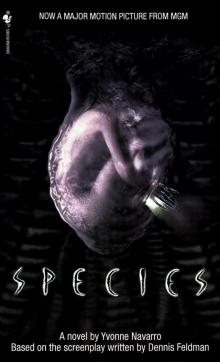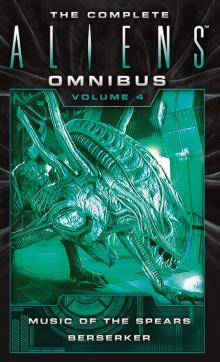- Home
- Yvonne Navarro
Species II Page 2
Species II Read online
Page 2
“More?” Patrick asked, breaking into the discussion. They saw him point toward the Rovers and the small pile of red material it had gouged free of the Martian landscape.
“Yes, please. There are three canisters in the storage hatch. Ultimately you’ll need enough samples to fill all of them, and from different depths and areas, too. You might as well get started before you go out, so you have more time to explore the terrain. Besides, the less time you’re in proximity to the drilling mechanism, the happier we’ll be.”
Patrick nodded and bent back to his task, then looked up and smiled. “Go on, Anne. Take your Rover out for a ride. Mine is positioned so that I can see well enough with the module’s external camera, and we’ll want as much film as we can get. Staring at the same spot on the ground is no fun.”
The doctor’s face lit up. “Wonderful!” She bent closer to the screen, nose nearly touching its surface as she focused on piloting her miniature Land Rover in a tight arc around the base of the landing module. “God, look at this. Wouldn’t it be great if we had one of those ships they’re always flying in those science-fiction shows? Then we could just zoom around wherever we wanted, see what’s really in the deeper regions of the Valles Marineris canyon system, the Hebes Chasma.” Her words were starting to come so fast they were running together. “Or the Olympic Mons—can you imagine going down into the crater of a volcano that rises over fifty thousand feet high?”
“I wouldn’t go,” Dennis said, more to slow her down than anything else. Not just an observer, he was continually monitoring and adjusting the position of the Excursion relative to the landing module down on the Martian surface. “What if the volcano erupted?”
“Oh, there’s no indication of current volcanic activity,” Anne responded. “Face it, this place is empty.”
Dennis glanced at her. “I distinctly remember a media blitz a few years back about microbes having been discovered in a Martian meteorite—”
Anne raised an eyebrow at him. “Dead microbes are a long way from the kind of life needed to make mud pies, Mr. Gamble. There’s nothing out there now but wind and oxidized dust.”
Patrick’s voice interrupted them. “Afraid I’m going to have to side with Annie on this one, buddy.” A pause, then, “What do you say? Are we ready for me to go out and start the in-person collection process?”
Dennis chewed his lower lip nervously and checked the digital readout—1:00:37. Jesus, where had the time gone? Finally, he nodded. “Ready when you are.”
For a few moments, the radio remained silent. At last Patrick’s determined voice spilled from the multiple speakers in the control panel at the same time they saw his image on the screen reach for the space-suit helmet. When it was in place and locked down, Patrick said one more thing over the solo feed to the mother ship to make sure the audio connection was working:
“All right, Mars. Say hello to the human race.”
Patrick Ross stepped off the landing module’s ladder and onto Martian soil at about ten minutes after eleven on what was a perfect Saturday morning back on his home planet. If he could have seen the celebrations across the United States, he would have been embarrassed at all the fuss; he wasn’t quite sure how he’d become an all-American hero, and the truth was, all this attention just made him flustered. He couldn’t show that, of course—he’d been raised to speak clearly and proudly in public and to do right by the image of his father, Senator Judson Ross. There was the memory of his mother to consider, too—if he didn’t always agree with his father, he was determined to do right by her. She had been sweet, patient, and taken from the family way too soon. Without getting too Freudian, Patrick saw some of the same character qualities in his lovely girlfriend, Melissa. She didn’t know it yet, but someday she’d be the wife of an American astronaut and the mother of his children.
He felt the life-support system on his EVA suit register the swift drop in external temperature and adjust the body temperature-control unit to accommodate it. Numbers flashed across the small optical display just above eye level on the inside of his helmet, and one of those numbers told him it was slightly under one hundred and eighty degrees Kelvin on the Martian surface—a staggering one hundred thirty-five degrees below zero Fahrenheit. After all these years and all the moon and space walks he’d done, it still amazed Patrick that he, or any man or woman, could actually be walking around in an environment that brutal.
He stopped and just stood there for a few moments, drinking in the sight of the Martian landscape in a close-up way that no one else in history had ever experienced: the terrain filled with dark, porous rocks; the rusty-red, sandy-textured soil; a sky painted the color of salmon from atmospheric dust. The view stretched across his vision and beyond for as far as he could see with a stark, unrelenting beauty that was almost mesmerizing.
Patrick broke the spell himself, knowing that if he didn’t move forward soon, the radio would cut into the silence around him and ruin the moment. With graceless movement, he turned and punched in the code to unlock the exterior storage compartment; when the hatch dropped open, he lifted out a small folded package and the rack containing Anne’s trio of bright orange canisters. Five halting steps took him far enough away from the landing module to give the mother ship a view on the video screen that was unmarred by any man-made object but the one he painstakingly unfolded. He snapped open the metal rod at one end, then pushed it deep into the dry, blood-colored soil. Patrick knew that when he spoke, the transmission would fill his voice with static from atmospheric interference, so he said his words slowly and as clearly as he could, while the cold Martian wind straightened the folds of the American flag:
“Not for one nation, one people, or one creed, but for all humankind.”
Mankind had finally conquered Mars.
Back Home on Earth
Millions of people across the nation raised their voices in celebration, hoisting everything from beer bottles to coffee cups to cans of soda. Fixed before their television sets at home, in bars, in health clubs, and during reluctant Saturday work sessions at the office, they all listened, exhilarated by the success of the Mars mission and captivated by the voice of Peter Jennings.
In a world beset by violence, hunger and strife, there are still occasions when mankind surpasses the petty struggles of daily existence.
Nowhere, however, was the elation more intense than at Mission Control in Houston, Texas.
Of the three huge screens that dominated the room, two of them showed a live feed from the landing. The massive room was alive with applause and yelling, the workers and technicians at a hundred and ninety-seven work stations slapping each other on the back with glee and spinning foolishly in chairs before their consoles to celebrate the culmination of years of work. In a glass-paneled viewing room behind the main control area, a smaller but no less elated group laughed and raised glasses of champagne to toast each other and the space-suited figure on the screen as newscaster Peter Jennings supplied them with the media viewpoint via a small television set off to the side:
The Excursion voyage to Mars is one of these occasions. Today, America is proud!
Impeccably dressed in a deep blue suit, every silver hair in perfect place, Senator Judson Ross put his arm around Melissa Evans and gave her a gigantic, fatherly hug. “He did it, Missy!” He let go of her and began shaking hands with the NSEG officials milling happily around the room, his mouth stretched in a beaming smile. Excitement made his words slip into the slight southern drawl that he’d worked to shed, but right now that was okay. This was his grand moment, the day that brought the United States success in the Mars Space Program that he himself had pioneered, the red planet conquered by none other than his own son Patrick. “Look at him up there,” he exclaimed. “He’s on Mars!”
“Your son’s a hero, Senator Ross,” an NSEG official whose name he couldn’t recall told him. “A true-blue hero—congratulations!”
Senator Ross nodded, delighted at the response, relieved that Patrick was up th
ere and seemed to be doing okay, safe as you please; he never would have told anyone how scared he’d been at the prospect of his boy traveling over thirty-five million miles—a distance nearly inconceivable to him—and stepping out of his spacecraft. But it was okay, he was there and safe, and everything was fine. Thank God.
The smile plastered to his face, he made his way around the room again, downing a glass of Dom Perignon on the way.
The Garberville Psychiatric Institute in Maryland was lovely, a top-of-the-line facility reserved for special people thrust into “special” situations. From the outside, the Institute looked like a New England mansion: quaint red brick; shutters painted bright white framing lightly tinted windows; petunia-filled flower boxes even adorned the windowsills above neatly shaped hedges. A long, curving drive flanked by marigolds led to a locked—discreetly, of course—double front door next to which was a small brass doorbell and an inconspicuous sign that read “Visitors By Appointment Only.” The grounds were quiet and peaceful, intentionally inviting.
Inside, the environment did an about-face.
Beyond the scrupulously decorated and maintained entry foyer, reception area and receiving offices, the walls were pitted and cracked, both from age and the force of blows thrown by residents for one reason or another. Well hidden behind the exterior’s solar tint on the windows was a layer of steel mesh embedded on the inside of the glass. Furniture was sparse and strictly functional: hard-cushions on the couches and chairs that couldn’t be used to smother a fellow inmate, steel legs and arms on the tables that couldn’t be broken off and used as a club. The Institute was old enough so that the bare tiles on the floors were asbestos-based, but the directors and big-armed orderlies didn’t care. They had enough to worry about just trying to keep the residents’ behavior at a level vaguely approximating acceptable control.
In the game room—checkers and cards only, no sharp objects allowed—the television was mounted high at the juncture of the wall and the eight-foot ceiling and turned on. Only a few of the ten or twelve men and women in the room were paying any attention to the running report of the Mars space landing; many were tranquilized to keep them quiet and to ensure the safety of their fellow residents. The television was, quite simply, something with movement and noise on which they could focus beyond the misery surrounding them. One of the orderlies—Joey—had tried unsuccessfully to find a sports game, but the Mars landing was on all the main channels, and the Institute wasn’t about to spend good money on cable television.
One of the residents, a patient named Herman Cromwell, had pulled a chair to a position directly in front of the television, he could focus completely on the screen without having his view obstructed by any of the others in the room. Joey watched him suspiciously, but he seemed okay, doing nothing other than listening intently to that Peter Jennings guy on the tube—
Patrick Ross. Son of a senator, football star at Yale, and now the first man on Mars. Intelligent, dependable, caring—a perfect hero for these imperfect times.
Cromwell leaned forward on his seat, his face straining toward the screen. It was chilly in the game room—it was chilly everywhere at the Institute—but perspiration gleamed on his shaved head. His eyes, a disturbingly intense cobalt blue, were wide and anything but vacant. When he spoke, it was with such conviction that everyone in the room, drugged-out or not, turned to stare at him.
“I told them not to go!”
Aw, Christ, Joey thought as he saw Cromwell’s fingers dig into the armrests of the chair.
Here we go again.
On the Surface of Mars
“How’s it going out there?” Anne Sampas asked. Beneath the radio headset, her gaze was fixed on the video feed, watching the diamond-tipped mechanism on the Land Rover plow into the sandy red surface of Mars. The picture had deteriorated, then straightened out again, fading back and forth as it fought against unseen pulses of solar interference. Right now it looked pretty good, and she could see Patrick using a small scoop to fill the second of the three sample canisters. At the navigator’s console a few feet away, Dennis was keeping his usual close eye on the Excursion’s orbit position relative to the location of the landing module on the planet’s surface.
“Not bad,” Patrick answered. “The soil is loose but the drill is still showing signs of wear and tear.”
“One more area,” she noted. “Sector one twelve. It looks like it might’ve been a canal bed.”
Dennis looked over from the control chair and smiled. “Signs of water?”
“That’s what we hope to find out.”
Patrick’s voice came over the radio again, fuzzy at the edges but understandable. “Eight years of training and I’m a Martian ditch-digger.”
Dennis pressed the audio button on his own headset so he could join the conversation. “Quit complaining. I thought you said you liked making mud pies.”
“Like Anne said,” Patrick came back, “there’s no water.”
Anne smiled. “Sorry, pal. Mining is part of the job description.”
Dennis glanced over at the LED display that was synchronized with the one in Patrick’s landing module: 4:27:38 and counting. “You’ve got about an hour and a half of surface time left, Patrick.”
“Roger that.”
“Don’t push it, Patrick. You need to be off-surface well before Martian nightfall. If you think it’s cold now, try dropping to a hundred and thirty degrees Kelvin,” Anne said.
“For the temperature challenged like you,” Dennis interrupted with a smirk, “that’s two hundred and twenty-five below zero.”
“Gee,” Patrick responded. “Thanks so much for your help. I couldn’t function without you.”
“Look at him down there,” Dennis said an hour later. He and Anne studied the wide-angle video feed from the landing module, which showed Patrick taking halting steps across the rock-strewn surface, moving carefully around the jagged edges of large, dark stones. “He’s just like a speck of . . . I don’t know . . . dust.” He followed his friend’s movement, his forefinger tracing the screen. “See? A little dot moving across the horizon.”
Anne leaned toward the display. “Wait—what’s he doing? Why did he stop?”
Dennis thumbed his voice feed. “Patrick?”
The barely recognizable form on the screen paused for a long moment. Finally, Patrick spoke. “Did you know that Mars got its name from the Roman god of war?” he asked. “But I can’t figure out why—I’ve never felt such peace. It’s like I’m here with God.”
Anne smiled. “Perhaps you feel that way because the Roman god Mars was not always so destructive. He was originally the god of spring vegetation, Mars Sylvanus. Among other things, Mars was also known to be the lover of Venus.”
“Patrick,” Dennis broke in, “I’m afraid it’s time for you to leave your gods behind. Shake your legs and head on back to the module. ET until module liftoff is thirty-five minutes and counting.”
On the display, Patrick gave them a choppy-looking salute. “Copy that, Dennis. I’m on my way.”
An hour and ten minutes, no more—
And Dennis Gamble and Anne Sampas turned to stare as the airlock door to the docking bay slid open. Patrick Ross grinned at his cohorts but didn’t say anything, and for a long moment, neither did they.
Then they all started whooping and hugging at once.
“You are the man!” Dennis shouted. He whirled a laughing Patrick around the small control area, then gave him a push that sent him toward Anne.
She caught him in an amiable hug, then ruffled his dark hair like a schoolboy’s. “Great job, Patrick. You’ve done us proud, young man!”
“Aw, knock it off, you two,” Patrick said. “It was no big deal, not really.” He took a step back to the docking-bay door and retrieved the rack of sample canisters, then snapped it into its holder on the rear wall.
“No big deal, huh?” Dennis rolled his eyes. “If that’s so, then why is the President of the United States waiting to talk to
you?”
“Oh, boy—why the heck didn’t you say so!” Patrick hurried over to the command chair and fumbled on the headset, pushing the switches to bring up the audio and video feeds. “Commander Patrick Ross here, Mr. President,” he said respectfully. “I apologize for keeping you waiting.”
A few beats, then the President’s smooth, practiced voice rolled into the Excursion’s cockpit, and the three astronauts could tell by his words that the rest of the world was hearing him at the same time. “Captain Ross, this is a tremendous achievement that once again proves to the world that if we rise above partisan politics, America can climb to the heavens.”
Patrick smiled at the clearly rehearsed speech, pleased nonetheless. “Thank you, Mr. President. But the credit should go to my crew. I couldn’t be up here without them.”
“The three of you definitely make an excellent team. Please accept my invitation to be my guests at the White House.”
“We’d be honored, sir,” Patrick replied. He glanced at his two partners, an impish grin tugging at his mouth. “But I’m afraid you won’t change my mind. I’m still a Democrat.”
Rich laughter filtered over their headsets. “Come home safe, Commander Ross. Our prayers are with you.”
“Thank you, sir.”
Dennis hit the cut-off switch and turned to his companions. “Ready to head home?”
For a moment, neither spoke. Then Anne exhaled. “Wow, I can’t believe it’s over. All those years to prepare, and now—already it’s just a memory.”
Dennis chuckled. “Then let the memories begin. We’ve got a lot of those to go through when we hit home, not to mention the flight time back to Earth.”
“Yeah, but the actual Mars walk—” Patrick began.
“Oh, quit your griping,” Dennis said lightly. “We’ll walk with the Martians again sometime. You’ll see.”
Anne smiled. “Little green men?”
“I thought you said they’d be red.”

 Hellboy
Hellboy Concrete Savior
Concrete Savior Species
Species AfterAge
AfterAge Ultraviolet
Ultraviolet Highborn
Highborn Species II
Species II Aliens Omnibus 4
Aliens Omnibus 4 Paleo
Paleo Elektra
Elektra